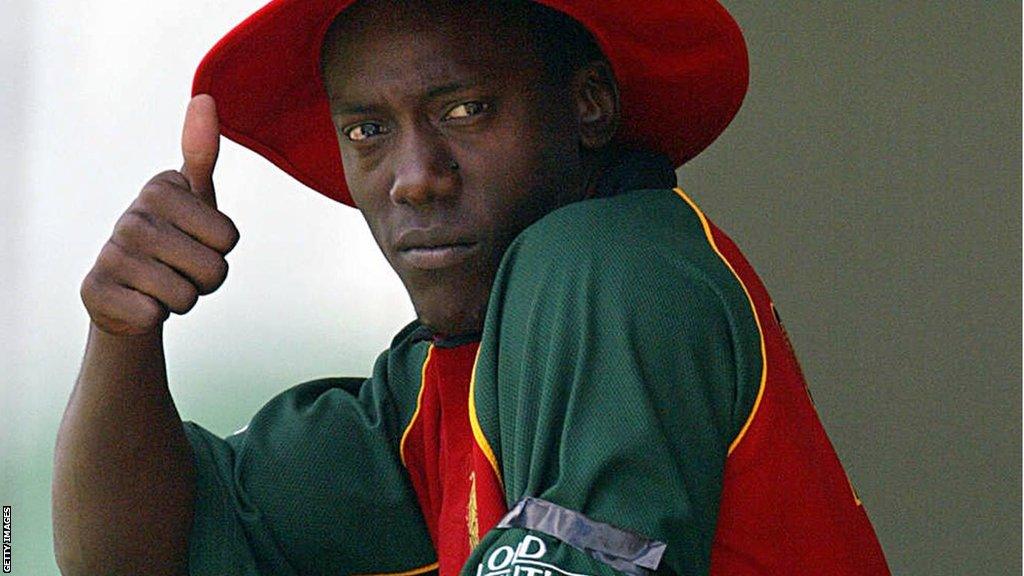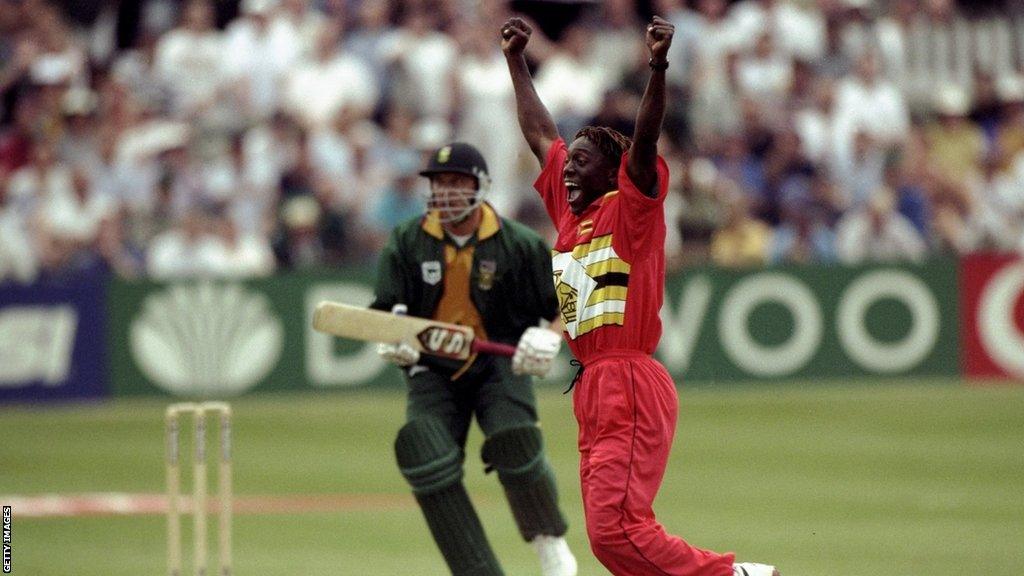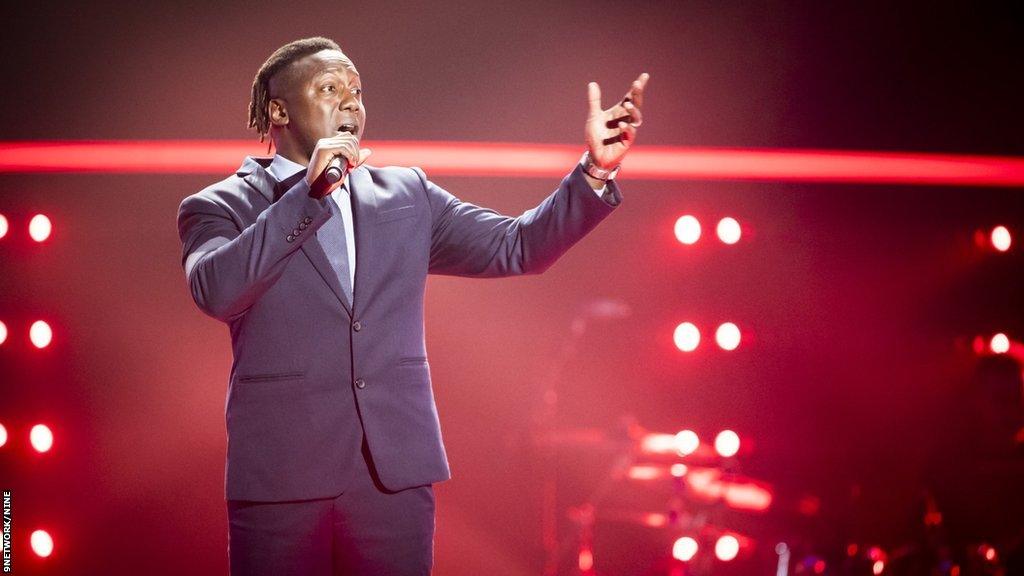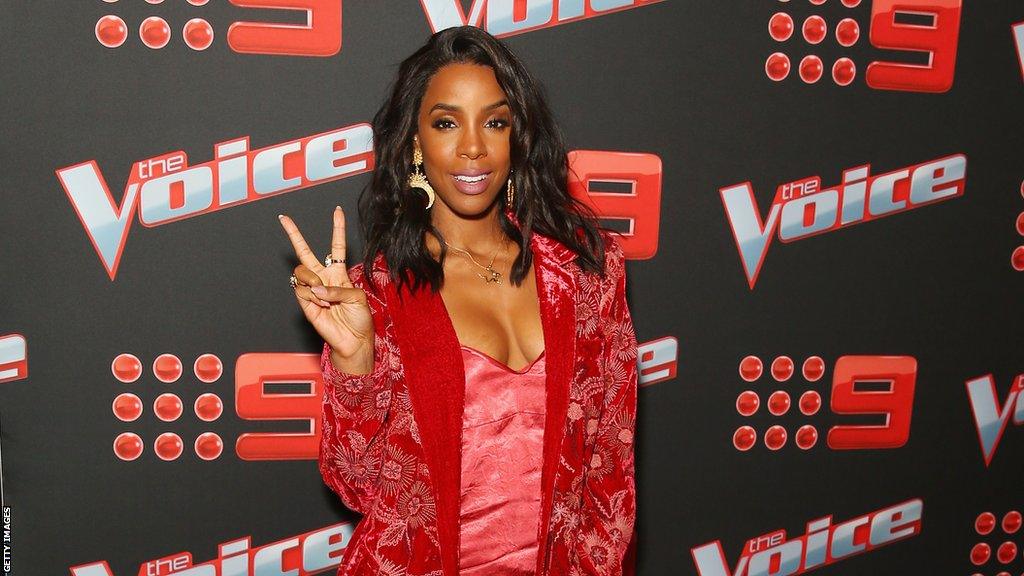Cricket World Cup 2023: Zimbabwe's 'forgotten man' Henry Olonga felt 'hated' for black armband protest
- Published

Henry Olonga and Andy Flower donned black armbands at the 2002 Cricket World Cup to protest against the Robert Mugabe regime in Zimbabwe
Zimbabwe's first black cricketer, Henry Olonga, says he has felt "hated" for 20 years following his black armband protest against his country's then-president, Robert Mugabe.
Olonga and team-mate Andy Flower made the stand against "the death of democracy" in their country at the jointly-hosted 2003 World Cup in South Africa and Kenya.
The pair have lived in exile ever since, while Mugabe remained in power until 2017.
Flower would go on to coach England to successive Ashes triumphs.
A different path awaited Olonga with an appearance on TV talent show The Voice in 2019, where he was coached by Destiny's Child star Kelly Rowland, bringing him back to his first love - singing.
A journey that began by escaping Zimbabwe under a blanket, however, has taken its toll.
"I'm a forgotten person as far as the world of cricket goes," Olonga told BBC Sport Africa.
"With each passing decade, it might grow in significance. The closer to death people get, the more they're celebrated, I suppose. When they pass it's 'they're amazing - he was such a brave man'.
"For the first 20 years - or 17, anyway, until Mugabe died - I felt like the most hated man in Zimbabwe."
'I was my own man'
By the end of the competition in 2003, Olonga - only 26 at the time - joined the then 34-year-old Flower in announcing his retirement from international cricket.
"I'd been called all sorts of names - and that's what I had to continue to face for the first decade after I did the protest," Olonga recalled.
"People thought I wasn't smart enough to wake up by myself: 'Oh, Andy Flower bullied me into it all'.
"People were very unkind. They didn't understand the depth of thought that I put into doing the protest.
"I was my own man.
"I'm a man of religious conviction so my faith played a part, but so did my growing political awakening. I met politicians who told me what it was really like to be in opposition to Mugabe.
"We had three or four years since the farm invasions began and were dealing with a foreign press constantly asking us whether we should have sanctions imposed on us, because of the human rights violations back at home and the crumbling rule of law.
"So there was a lot of food for thought and I had to digest a lot. Once I assimilated it, I decided that was it."

Olonga appeared at the Cricket World Cup in 1999 and 2003 and still holds the best bowling figures for Zimbabwe in a one-day international
Olonga says the legacy of his actions still haunt him now: "I've done a lot of gigs where Zimbabweans have been there. And they sometimes say very unkind things.
"My interactions with people are either bitter or sweet. It's very rarely in the middle and a lot of people believe politics and sport shouldn't mix.
"I'm hyper-sensitive around cricket. Some people - especially cricket-loving Zimbabweans - think I started the rotten Zimbabwe.
"A lot of people say, 'it all fell apart when Olonga and Flower did that'.
"Within a year or so in 2004, a lot of white players got kicked out or sacked and Zimbabwe cricket hasn't fully recovered.
"I'm not suggesting in any way I shoulder responsibility over that.
"The truth of the matter is, Australia's my home. It's the country I will die in if I ever was given the choice. I don't see myself going back to Zimbabwe to live.
"If they invite me back for the 50-year anniversary of the black armband protests, because a more liberal and democratic party is in charge, maybe I'll go. I don't know."
An exile's journey from England to Australia
Mugabe, who died in 2019, was replaced as president by Emmerson Mnangagwa after a coup in 2017.
Zimbabwe remains in political turmoil now, with opposition leaders alleging August's elections, which handed Mnangagwa a second term, were rigged.
Olonga, now 47, began his exile in England before moving to Australia seven years ago.
"My dad is still there [in Zimbabwe] - he is in his mid-80s, and I don't know if I'll see him again," Olonga said. "My brother lives there but video calls are not the same as meeting them in person.
"I lost not only my career, but my home. I lost a fiancé in the process. In the eyes of a lot of Zimbabweans, I lost any sense of respectability because for the next decade I was persona non grata and judged to the hilt.
"It's only now with the passage of time people have moved on. Mugabe is dead. Mnangagwa, Mugabe's second in charge, is now in power and I think people have been through a few cycles of hyperinflation and suffering and pain.
"Now they're saying: 'maybe we have been fooled, maybe these guys had a point 20 years ago and we should have paid attention'.
"People are softening and are at least seeing that I had a point or that I should have had the right to have a point because there's a lot of noise being made about Zimbabwe being a democracy.
"I have been consistent in my condemnation of what has happened and still continues to happen in Zimbabwe."

Olonga progressed from the knockout stages of The Voice but was eliminated in The Battle for a place in the final
Olonga, who at 18 was also his country's youngest player, still holds the record bowling figures for a Zimbabwean in a one-day international when he claimed 6-19 against England in 1999.
Three wickets in the three-run victory against India followed at the 1999 World Cup.
With the move to Australia, his other burning passion continued and he sung with the Adelaide Symphony Orchestra before being brought fully back into the media spotlight.
"The Voice was quite the experience," he recalls. "I did a gig with the police band at the local Adelaide Town Hall.
"Someone made a comment, a review or a video, and somehow this worked its way into the hands of the scouts at The Voice.
"One of the most harrowing experiences I had was doing the live audition. I was easily the oldest person, by about 20 years, surrounded by teenagers - I was probably the only black person in the room as well - you can imagine the trepidation.
"It was a great experience. It really was. I chose Kelly Rowland as my coach. Being in that bubble was quite surreal.
"It was quite sobering for me because I've come a long way. I used to play cricket in Zimbabwe, I then did my thing and then ended up on a world stage, to show the world that I could 'attempt' to sing.
"I would have liked to go further," he said, having fallen just short of the final. "But it was also a great privilege to be on the show.
"It's taken me nearly 20 years to get my foot in the door. It's a major segue, and being totally honest, I'm sort of a struggling, broke musician.
"After Covid, I found myself unemployed for a couple of years, and struggling to get bookings and gigs. Now I don't just sing, I tell my story as well. I do public speaking, I think that's my main source of income, to be honest."
On The Voice, Olonga sang a rendition of Anthony Warlow's hit 'This is the Moment' while his renditions of Nessum Dorma were among the songs that grabbed attention before and after his appearance on the show.
Indeed, he conceded, when challenged on being a 'broke' musician, that his pursuit of a music career may only just be beginning given a tenor's or baritone's voices only mature in their forties.
"I can carry on singing until I can't anymore and that's what I fully intend to do. I love my music. I love performing - I think I'm just coming into my own in the sense that my voice is reaching maturity now.

Destiny's Child singer Kelly Rowland was Olonga's coach on the The Voice in 2019
"I can forge a new path, and not really focus on whether I'm remembered or forgotten as much in the world of cricket."
Whether Olonga's second career leads to international success in the same way his cricket career did remains to be seen but it has come as a comfort to a man, who has already fought a battle few will ever face.
"It would be a sweeter second career," he said. "When I played cricket, I had lots of ups and downs. The political protest cost me my career, I got death threats and had to flee.
"All of that left a wound in me.
"Cricket was a messy divorce. Far from being celebrated at the end - being given a guard of honour - I was told I couldn't be on the bus with the rest of the team, had death threats, went into hiding and then was vilified by my fellow countrymen - people I was trying to help.
"Cricket has been a weird one for me - it was a source of pain for many years, in a way that music never was.
"Music to me in a sense was therapy.
"It's very cathartic to be able to sing political songs about Zimbabwe. So I sing Redemption Song by Bob Marley. I wrote a song many years ago called Our Zimbabwe, which is a very patriotic song about one's pride in one's nation.
"Music really has been a healing balm for the loss I experienced in cricket."
The 2027 Cricket World Cup returns to Zimbabwe
Olonga has not fully ruled out a more imminent return to Zimbabwe but says he will only go if invited. In 2027, Zimbabwe will co-host the Cricket World Cup once again.
Maybe a neighbouring venue will bring him close - either way there is no regret.
"There was a song I learned in junior school from the film 'Goodbye, Mr. Chips'. It stayed with me, and it epitomises what we're discussing.
"In the final verse: 'In the evening of my life I shall look to the sunset, At a moment in my life when the night is due. And the question I shall ask only I can answer. Was I brave and strong and true?'
"I suspect that song has been an anthem for me in all of my life and had a role in the black armband protest.
"This idea of trying to make a difference, to make the world a better place, to leave a legacy that people remember you for more than just wickets, how much you made or how much of a name you made for yourself.
"I don't think they satisfy as much as doing the right thing and feeling that there was a moment in time when you could have made a difference and you stood up and were counted.
"So the guard of honour is certainly not as satisfying as reflecting: I was brave, I was strong, I was true - I was.
"That self respect is something that no-one gives to you. You have to earn it by your choices and decisions.
"I hope most people will think that I was a man of substance, I was a man of conviction for what was right.
"If I die knowing that a lot of people at least gave me kudos for that, then I've done my work on Earth."
Henry Olonga has just released the 'expanded' version of his autobiography Blood, Sweat and Treason as an audiobook.